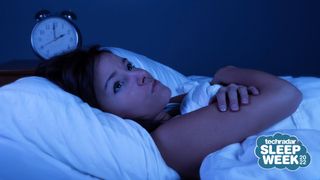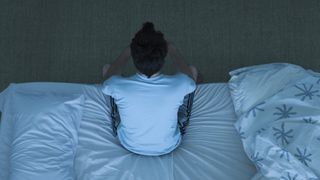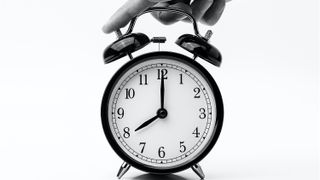Sleeplessness at night: how insomnia affected me and how I dealt with it
What insomnia is like to live with and how to transform your sleep, by author and sleep expert Kate Mikhail

Insomniacs the world over know what it’s like not to be able to sleep. Whether that’s the inability to fall asleep easily or to stay asleep, the result is the same: sleepless nights, insomnia anxiety, followed by exhausting days.
I was a chronic insomniac for decades, and would lie awake for hours and hours, my mind whirring with thoughts. The more tired I became, the more wired and engaged my mind became, ironically.
And then insomnia anxiety would take hold – the worry that I wouldn’t be able to get to sleep but had to be up for work first thing, which put me in a state of fight or flight, with all the sleep-sabotaging hormones that come with that, when I needed to be in a state of rest and digest. A predictable, infuriating waste of time, at the very least, but also a stressful routine that was destabilising at times.
- How to use the Military Sleep Method to fall asleep faster
- A TikTok doctor shares the sleep technique that solved his insomnia
Running on empty
Our nights feed into our days and a lack of quality sleep impacts everything about our waking hours: how much energy we have, our health, cognitive function, moods, resilience, happiness, productivity….
My chronic insomnia left me feeling exhausted come morning, with recurring burn-out days and my emotions were far from even
Pre-kids I was more able to work around this, slipping into social jet lag, with long weekend lie-ins to make up for the lack of sleep midweek. But while that social jet lag seemed to help in the moment, it was actually disrupting my sleep-wake cycle and was no solution in the long-term.
At its peak, my chronic insomnia left me feeling exhausted come morning, with recurring burn-out days and my emotions were far from even. With no understanding of sleep or what shapes it, I just struggled on, not realising that this sleep-deprived night-day circle is something that can be actively controlled and changed for the better.

Tactics that didn’t touch my insomnia
Lavender oil, eye shades, ear plugs, sleepy teas, herbal remedies and the rest can all help, but unfortunately they are not enough to break chronic insomnia, or to deal with the actual causes behind any difficult sleep problems.
Get daily insight, inspiration and deals in your inbox
Get the hottest deals available in your inbox plus news, reviews, opinion, analysis and more from the TechRadar team.
Prescription sleeping tablets acted as a vital safety net for me, for those late, late nights, when anxiety threatened to escalate, and it was essential I got a few hours sleep before the alarm went off. Thankfully, they’re not needed anymore.
The fact is, our sleep is individual, the result of what is going on in our mind and body and our day, as well as the world around us, and if we can look at sleep in this wider, deeper context, we can understand why it is the way it is, and then make small changes in our day that can alter our physiology, habits and our mindset, to help set us up for the best sleep possible at night.
Knowledge equals quality sleep
Being aware of the basic biology and science of sleep and how this relates to you and your life is key to transforming the quality of your sleep. For example, by understanding habit science and how habits take hold in the brain, we can take action to establish new sleep friendly habits.
Likewise, being aware that humans are hard wired to respond to the light signals that are all around and being able to work with this is something that has a huge impact on our circadian rhythm and our sleep.
I now use a number of light tactics to structure my day, such as early morning walks, so that I’m sending the right light signals that will trigger the physiological response I need in the moment and for a strong sleep-wake pattern.
- Rise and shine with a wake-up light
A powerful sleep habit cue
Richard Waters was a pioneer in cognitive therapy and clinical hypnosis 100 years ago and he was also my great, great uncle who first inspired me to research the biology and science of sleep.
A sleep script is a positive affirmation of what should be happening in your mind and body before and during sleep
One of the first things I did, when it dawned on me that perhaps I could fix my chronic insomnia, was to record myself reading a short sleep script written by Waters, and to start listening to this on a daily basis.
A sleep script is a positive affirmation of what should be happening in your mind and body before and during sleep and it taps into the extraordinary power of suggestion, which medics and scientists are exploring with incredible results.
Neuroscience shows that our words and thoughts change our physiology and how we actually feel. A sleep script works by helping us to adjust our mindset, physiology and behaviour, and as a result the quality of our sleep.

Stress busters for sleep
The stress, tension and over-stimulation of life can leave us with too much of the stress hormone cortisol in our body, which undermines both our health and our sleep.
Curious to see how well you're sleeping each night? The best sleep trackers can give you insight into how much sleep you're getting and the quality of your shut-eye too. They come in different styles, including watches and smart rings.
Stress is blamed for nearly 50% of sleep issues, according to the Sleep Council’s Great British Bedtime Report, so if we can better manage our stress, then we can improve our sleep.
I researched a large number of science based stress busters for Teach Yourself to Sleep: An ex-insomniac’s guide, and obviously different tactics work for different people and can depend on the situation.
Whether it’s reframing emotions, getting out into nature or being proactive about boosting the four happy hormones – dopamine, oxytocin, serotonin and endorphins – there’s so much we can do to shift our hormonal balance in favour of sleep.
Just roll with it
It’s good to remember that sleep is never set in stone. It tends to reflect what’s going on around us, as well as within us, and most of us, even the strongest sleepers, will experience sleep issues at some point in our life, even if that is just a short-term disruption due to ill health.
By understanding our sleep in relation to our day, however, and all the elements that influence it, we can respond and adapt, and take action to strengthen our circadian rhythm and make physiological changes that put us back on the path to a deep, restorative sleep.
Read more:
- The best mattresses for every budget
- Drift off on the best pillows for all sleep styles
- I tried the 4 7 8 sleep method to see if it does help you fall asleep faster
This article is part of TechRadar's Sleep Week 2022 (running from Sunday 13 to Saturday 19 March), a week-long celebration of all things slumber. We'll be bringing you proven techniques and tips to help you sleep better, and have rounded-up all the top-rated tech to transform your sleep.
Kate Mikhail is an author, journalist and sleep expert who has written for prestigious publications including the Guardian, Observer, Telegraph and the Independent. As an ex-insomniac, Kate enjoys using her work to help others to improve the quality of their sleep, health and wellbeing.

